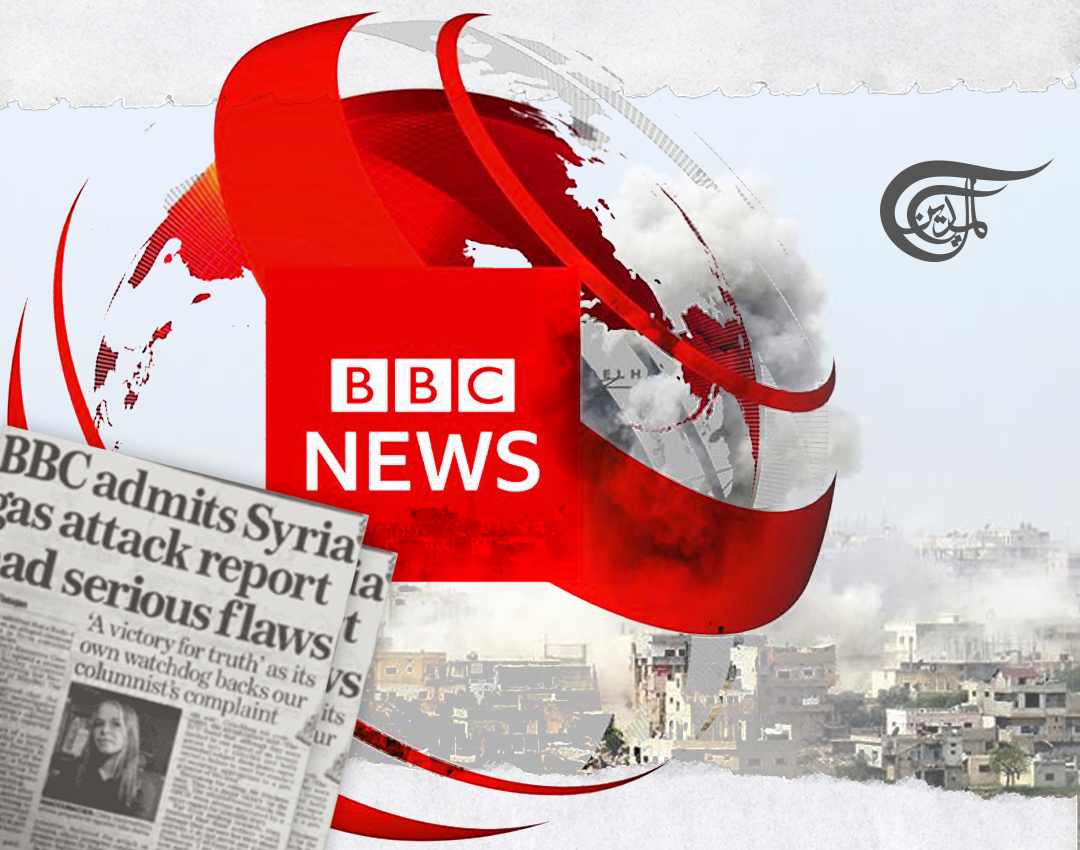BBC Apology over Douma Coverage
BBC barely mentioned the news of their admission that its coverage of the incident was “seriously flawed”, although did at least publish the outcome of the complaint on its website.
“A victory for the truth” was how the apology from the BBC over its coverage of the alleged chemical attack in the Syrian city of Douma was welcomed by the right-wing British tabloid newspaper the Daily Mail last week.
Blink and you’d have missed it. The state broadcaster itself barely mentioned the news of their admission that its coverage of the incident was “seriously flawed”, although did at least publish the outcome of the complaint on its website.
None of the major British newspapers such as The Times, The Telegraph, or the liberal mouthpiece for war with a human face, The Guardian, gave it column space despite the serious nature of the matter.
It would of course have embarrassed them too, as it would have rightfully have cast doubt over the credibility of their respective coverage of the war on Syria, with most supporting the case for British military intervention, subtly or otherwise.
The BBC apology only came about because The Mail on Sunday’s conservative columnist Peter Hitchens had raised a complaint about the BBC Radio 4 program, Mayday: The Canister On The Bed.
Broadcast last November, it centered on the events of Douma in 2018 in which an alleged chemical attack took place that was blamed - without any concrete evidence - on the Syrian government of President Bashar al-Assad.
Hitchens objected to the narrative of the program and in particular the slurs leveled against a whistleblower from the Organisation for the Prohibition of Chemical Weapons (OPCW) who was given the pseudonym ‘Alex’ to protect his anonymity.
The BBC falsely claimed that ‘Alex’ only cast doubt on the official narrative of the events as he was induced to do so by the promise of a $100,000 payment by WikiLeaks.
But WikiLeaks insisted that no such payment had been made and the BBC admitted it had no evidence to suggest that the former OPCW inspector - described as “a highly qualified and apolitical scientist” - had ulterior motives in going public with his doubts about the attack.
In an astonishing and rare verdict, adjudicators from the BBC Executive Complaints Unit (ECU) found that the program, made by investigative journalist Chloe Hadjimatheou, failed to meet the Corporation's editorial standards for accuracy by reporting false claims.
But this was no light matter. Britain and France - on the coattails of the United States - launched a missile strike on Syria that could have precipitated a wider regional conflict with disastrous results.
It could have edged closer toward a dangerous war, pitting world powers against each other and causing more devastation and loss of life than imaginable.
Hitchens was one of only two journalists in Britain that covered the events in Douma who highlighted the flawed OPCW report. The other was me, for the Morning Star newspaper - odd bedfellows indeed as was pointed out at the time.
Our extensive coverage was a stark contrast to the silence from the rest of the British press who seemed comfortable in repeating uncritically the line of the western powers; that Assad was a monster using chemical weapons on his own people.
But all of those who at the time veered from the acceptable mainstream narrative - which was identical to that of the British government - were dismissed and smeared as cranks, or in my case “an Assadist” - meant as a slur.
Even the late award-winning journalist Robert Fisk, the first and only western journalist on the ground was brushed off as a “pro-Assad sympathizer” in a crass bid to discredit his work.
But his revelations touched on something different, asking the question of whether a gas attack had even taken place at all.
Fisk’s report, which followed a visit to the hospital and interviews with doctors and other medical staff along with residents of the city that had recently been liberated from jihadists, suggested that the attack could have in fact been staged to prepare the ground for western military intervention.
People he spoke to mentioned the role of the White Helmets - a pseudo-humanitarian group established in 2014 by a former British army officer and funded by the US, the British Foreign Office, and the very powers seeking to overthrow the Assad government.
The group - portrayed in the west as a heroic search and rescue team - is known for its links to jihadist groups many of whom allegedly fill its ranks. It only operates in areas held by organizations including al-Nusra, often sharing buildings with them, and is known for its elaborate propaganda videos.
Indeed soon after the attack, it began to circulate footage of Douma residents at a local hospital in what it said was evidence that a gas attack had taken place in the city, perpetrated by the Syrian government.
Fisk explained that those that remained on the ground in Douma seemed “perplexed” by the reports of a gas attack in which 43 people were said to have been killed. Most of the reports came from those that had arrived in Turkey as refugees, with none of those he spoke to seeming convinced that such an attack had happened.
One of those interviewed by Fisk, Dr. Rahaibani, reported that a member of the White Helmets - also known as Syria Civil Defence - shouted ‘gas, gas’ leading to panic among the victims at the local makeshift hospital, which was handily captured on film by the organization.
In the article published in the British newspaper the Independent, the medic says that the video was genuine, but that people were not suffering from the effects of poisonous gas, but from hypoxia - a lack of oxygen caused by dust inhalation.
Fisk said it was impossible for him to speak to the White Helmets in Douma to get their side of the story, as they had left their headquarters and taken the buses that had been organized by the Syrian government as part of a truce which saw the remaining armed groups taken to the northern Idlib province that remained under the control of Turkish-backed jihadist groups.
Predictably, because of his report, Fisk became one of those written off and dismissed as a conspiracy theorist, a lazy but effective way to discredit those that deviate from and challenge the accepted narrative.
It points to a worrying trend where investigative journalists including Fisk, John Pilger, and even Seymour Hersh are relegated to the fringes.
WikiLeaks founder Julian Assange - whose work exposed many of the crimes committed by imperialist powers in Syria, Iraq, and Afghanistan - remains in Britain’s high-security Belmarsh prison and faces extradition to the US and a lengthy jail term under the draconian Espionage Act.
The OPCW report into Douma has been debunked thanks to whistleblowers, but coverage of the flaws and manipulation of the body - which was established in April 1997 to oversee implementation of the Chemical Weapons Convention - has been studiously omitted by the mainstream media.
This should not come as a surprise - not a single media organization, other than the Morning Star and Mail on Sunday - followed up after revelations that the OPCW had hidden a dissenting report authored by senior engineer Ian Henderson.
He said that there was a high probability that cylinders were manually placed at two locations investigated by the OPCW team rather than being dropped from above by aircraft - the official narrative is that Syrian army helicopters were responsible.
The implications of this were obvious. It threw open the likelihood that the incident - in which the final OPCW final report found that no “organophosphorus nerve agents” were present - was staged.
The OPCW responded at the time by carrying out investigations into who leaked the dissenting report and then closed ranks saying that it was not prepared to give media interviews on the report. The press seemed happy to go along with this state of affairs.
That is a damning indictment of the state of modern journalism, which now - with a few honorable exceptions - sees the major newspapers and TV channels merely echo the views of governments and corporations rather than exposing them.
But our job is to shine a light into dark places and represent the public, not the powerful. We must continue to do so, we owe it to the people of Syria and the world.

 Steve Sweeney
Steve Sweeney
 8 Min Read
8 Min Read












